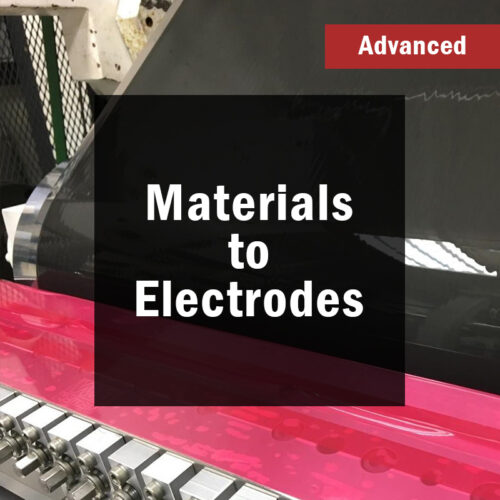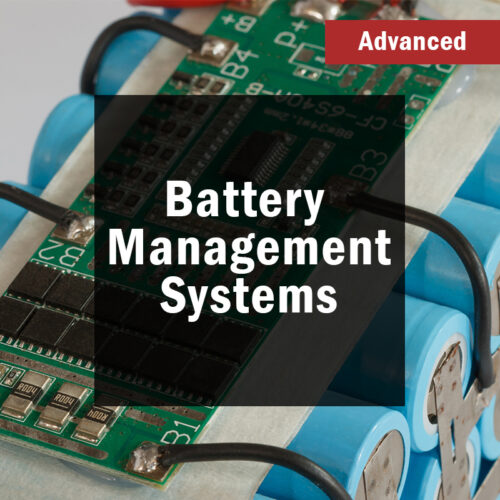-
 The E-Bike Batteries: Design Guidelines for Safety is a comprehensive standard developed by Soteria and industry partners to define best practices and advanced features for safer e-bike battery packs. It provides practical guidance for manufacturers and auditors to design, evaluate, and certify packs that exceed today’s baseline safety levels.
The E-Bike Batteries: Design Guidelines for Safety is a comprehensive standard developed by Soteria and industry partners to define best practices and advanced features for safer e-bike battery packs. It provides practical guidance for manufacturers and auditors to design, evaluate, and certify packs that exceed today’s baseline safety levels. -
 This course introduces essential safety aspects of battery manufacturing, testing, storage, handling, and disposal. It covers administrative and engineering controls, risks and hazards, mitigation, and safety compliance across all phases of the battery lifecycle. Participants will learn to recognize appropriate safety measures, use personal protective equipment (PPE) effectively, and identify key regulations to maintain safety standards and compliance. In addition, emphasis is given to the importance of personal responsibility for safety at all levels of the workplace and throughout the battery lifecycle.
This course introduces essential safety aspects of battery manufacturing, testing, storage, handling, and disposal. It covers administrative and engineering controls, risks and hazards, mitigation, and safety compliance across all phases of the battery lifecycle. Participants will learn to recognize appropriate safety measures, use personal protective equipment (PPE) effectively, and identify key regulations to maintain safety standards and compliance. In addition, emphasis is given to the importance of personal responsibility for safety at all levels of the workplace and throughout the battery lifecycle. -
 This mini-certificate discusses different methods for battery testing. The importance of testing, related standards, needed testing infrastructure and analysis tools are individually tackled. This series also highlights how the output of battery testing is viable for battery modelling that supports the battery use phase and can possibly be implemented on battery management systems.
This mini-certificate discusses different methods for battery testing. The importance of testing, related standards, needed testing infrastructure and analysis tools are individually tackled. This series also highlights how the output of battery testing is viable for battery modelling that supports the battery use phase and can possibly be implemented on battery management systems. -
 This mini-certificate explains how a lithium-ion cell can be designed, sized, and produced for a specific capacity and energy. The key steps in the selection and production of the main components of the cell, i.e. electrodes, separator, and electrolyte, are discussed. The slurry formulation, mixing, coating, drying, calendaring, cutting, stacking, electrolyte formulation/injection, sealing/packing, and formation cycles are detailed both in terms of machineries and the processing parameters.
This mini-certificate explains how a lithium-ion cell can be designed, sized, and produced for a specific capacity and energy. The key steps in the selection and production of the main components of the cell, i.e. electrodes, separator, and electrolyte, are discussed. The slurry formulation, mixing, coating, drying, calendaring, cutting, stacking, electrolyte formulation/injection, sealing/packing, and formation cycles are detailed both in terms of machineries and the processing parameters. -
 This mini-certificate provides a deep yet simple explanation of the operational principles of a rechargeable battery. The certification spotlights the importance and discusses the fundamentals of the ‘electrochemical cell’ which is the heart of any battery system independent of the storage size. A direct link is set forth between the chemical nature of the cell components and the storage properties of interest such as ‘electromotive force’ and gravimetric & volumetric capacities. Specific attention is directed towards lithium-ion batteries by presenting more details about the materials of choice for the anode/cathode together with their synthesis methods.
This mini-certificate provides a deep yet simple explanation of the operational principles of a rechargeable battery. The certification spotlights the importance and discusses the fundamentals of the ‘electrochemical cell’ which is the heart of any battery system independent of the storage size. A direct link is set forth between the chemical nature of the cell components and the storage properties of interest such as ‘electromotive force’ and gravimetric & volumetric capacities. Specific attention is directed towards lithium-ion batteries by presenting more details about the materials of choice for the anode/cathode together with their synthesis methods. -
 This certificate discusses the need of power converters for battery applications. It dives into the different types of power converters and explains the underlying principles. The use of power converters is illustrated via a number of applications. The fundamental concept of efficiency is discussed.
This certificate discusses the need of power converters for battery applications. It dives into the different types of power converters and explains the underlying principles. The use of power converters is illustrated via a number of applications. The fundamental concept of efficiency is discussed. -
 This certificate will allow participants to dive deep into power conversion systems that connect storage systems to smart grids and consumers, learning how to choose the right type of converter while assessing overall system performance with respect to energy efficiency. It also introduces battery management systems and the critical parameters that we can control, the use of battery testing and operation simulation in order to predict real-world in-service behavior.
This certificate will allow participants to dive deep into power conversion systems that connect storage systems to smart grids and consumers, learning how to choose the right type of converter while assessing overall system performance with respect to energy efficiency. It also introduces battery management systems and the critical parameters that we can control, the use of battery testing and operation simulation in order to predict real-world in-service behavior.






